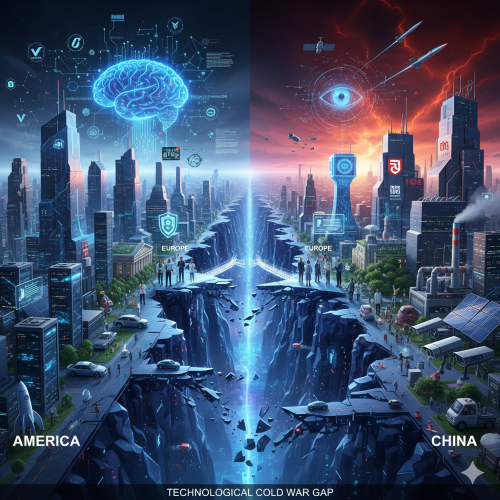How are China’s investments in 5G, 6G, and smart cities challenging American and European technological standards?

China's aggressive investments in 5G, 6G, and smart cities pose a direct challenge to American and European technological standards by shifting the global balance of power from a U.S.-led, private-sector model to a state-driven, hardware-centric one.
This challenge is rooted in China's ability to achieve economies of scale, its strategic control over key supply chains, and its push to embed its own standards within international bodies, all while bypassing Western security concerns and market-driven approaches.
5G: The Current Battleground-
China's challenge in 5G is not just about technology but about market dominance and the setting of global standards. Led by companies like Huawei, China has become the world leader in 5G infrastructure deployment and patent holdings. This success is a result of several key factors that directly compete with the American and European models.
-
Economies of Scale and Cost Advantage: Through massive state subsidies and a unified national strategy, Chinese telecom companies have been able to roll out 5G networks at a scale and speed unmatched by Western nations. This allows them to offer equipment at a significantly lower cost than their European competitors, Nokia and Ericsson. For many developing countries, this economic advantage is a powerful incentive to adopt Chinese technology, which effectively entrenches Chinese standards in those markets.
-
Patents and Standard-Setting: China's investment in research and development has given it a leading share of essential patents for 5G technology. By actively participating in international standards bodies like the 3GPP (3rd Generation Partnership Project), China is moving from being a "standard-taker" to a "standard-maker." This shift ensures that its technologies and IP are fundamental to the global standards, which gives Chinese firms a built-in advantage.
-
Security and Trust Issues: The most significant challenge to the U.S. and Europe is the security risk associated with Chinese technology. Citing concerns that Chinese companies could be compelled by their government to facilitate espionage, the U.S. has pressured its allies to ban Huawei and ZTE from their national 5G networks. This has created a geopolitical divide, forcing countries to choose between a cheaper, more advanced Chinese network and a more expensive but perceived as secure Western alternative. Europe, in particular, has been caught in the middle, with a mix of national responses and a desire to maintain a "third path" that is independent of both the U.S. and China.
6G: The Next Frontier-
The rivalry over 6G is a pre-emptive strike to avoid a repeat of the 5G dynamic. Both the U.S. and Europe have learned from the 5G race and are taking proactive steps to regain a leadership position. However, China is already well on its way, with its own distinct vision for 6G that challenges Western norms.
-
Early Research and Vision: While commercial 6G networks are not expected until around 2030, China has already launched experimental 6G satellites and is pouring vast resources into research on key enabling technologies, such as terahertz communication and AI-native networks. China’s strategy is not just about faster speeds, but about a more integrated vision of 6G as a "distributed neural network" that fuses the physical, biological, and cyber worlds.
-
Integrated Sensing and Communication (ISAC): A core tenet of China's 6G vision is ISAC, which integrates sensing capabilities directly into communication networks. This would allow a single network to not only transmit data but also to "see" and "sense" its environment in real-time. While this technology has incredible potential for applications like autonomous vehicles and smart cities, it raises significant privacy and surveillance concerns in the West.
-
Geopolitical Race for Standards: The race for 6G leadership is a battle to define the foundational principles of the next generation of connectivity. If China sets the standard, its geopolitical influence and technological dependencies will only increase. U.S. and European efforts, such as the Next G Alliance and the EU's Hexa-X project, are attempting to create a unified front to ensure that future standards are open, interoperable, and aligned with democratic values.
Smart Cities: Data and Governance-
China’s investments in smart cities challenge American and European standards by providing a model where data collection and surveillance are not only accepted but are central to the system's efficiency.
-
Surveillance as a Feature: In Chinese smart cities, facial recognition, AI-powered traffic management, and extensive sensor networks are not just for convenience; they are integral tools for social governance and control. This model challenges the Western emphasis on individual privacy and data protection, as epitomized by Europe's GDPR.
-
Vertical Integration: China's state-led approach allows for a level of vertical integration that is difficult to achieve in the U.S. and Europe's decentralized markets. The government can mandate the use of domestic hardware and software, creating a self-contained ecosystem where data is collected, processed, and analyzed by Chinese companies. This gives them an advantage in developing and perfecting their technology, while also raising concerns about a lack of interoperability with non-Chinese systems.
-
Exporting the Model: China is actively exporting its smart city model to countries in the developing world as part of the Digital Silk Road. This not only expands China's technological footprint but also influences a country’s approach to governance and data privacy, setting a precedent that is fundamentally different from the American and European models. This poses a long-term challenge, as it could lead to a global digital ecosystem fragmented into competing techno-geopolitical blocs.
- Questions and Answers
- Opinion
- Motivational and Inspiring Story
- Technology
- Live and Let live
- Focus
- Geopolitics
- Military-Arms/Equipment
- الحماية
- Economy
- Beasts of Nations
- Machine Tools-The “Mother Industry”
- Art
- Causes
- Crafts
- Dance
- Drinks
- Film/Movie
- Fitness
- Food
- الألعاب
- Gardening
- Health
- الرئيسية
- Literature
- Music
- Networking
- أخرى
- Party
- Religion
- Shopping
- Sports
- Theater
- Health and Wellness
- News
- Culture

